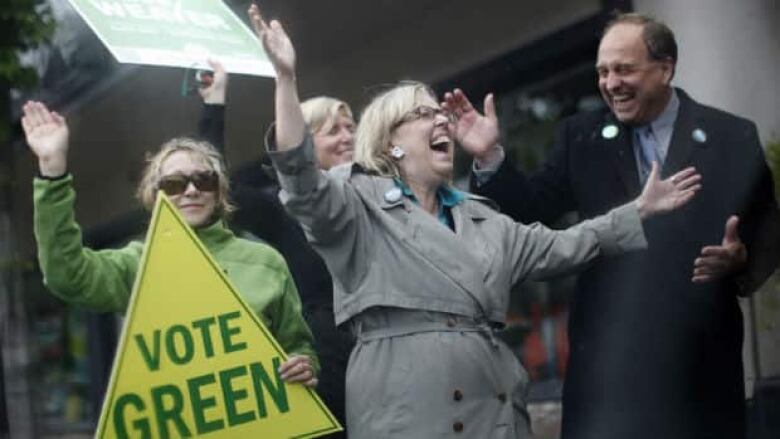B.C. election day may prove more than a 2-party affair
Different dynamic than in previous elections

Although other political parties have often tried to make their way onto B.C.'s field of play, provincial politics here has generally been a two-party contest.
The NDP on the left versus some sort of coalition party on the centre-right.
For decades that umbrella group on the right was the Social Credit Party, while for the past almost 22 years, it's been the B.C. Liberals.
The pendulum of power swings one way then it swings the other. Although it has only swung to the NDP three times in the past half-century.

This election, though, could be very different. Not only have other parties made it onto the field, they actually have a chance to play a significant role in how things turn out and may even end up with a seat in the big game at the Legislature.
Take British Columbia's Green Party. This election probably presents the Greens with their best shot ever to make an impact.
That may not be obvious in the province-wide numbers, given that the Greens are still only polling somewhere just above 10 per cent, not much higher than last election.
But the Greens have been very strategic in where they've focused their efforts. This time, they've put almost all their attention and resources into a handful of ridings on Southern Vancouver Island.
In particular, they are pushing to elect noted climate change scientist Andrew Weaver running in Oak Bay–Gordon Head, and Adam Olsen in the neighbouring riding of Saanich North and the Islands.
Together these two campaigns have managed to harness the momentum from federal Green Party Leader Elizabeth May's win here in the 2011 federal election, and that has given the provincial party a legitimate shot at its first elected seat, perhaps even two.
Meanwhile, on the right
Then there's the B.C. Conservative Party to consider.
Led by former federal MP John Cummins, the Conservatives looked for a time like they were a real force to be reckoned with and might even pick up a few seats.
At their peak, just under two years ago, this right of centre alternative was polling in the low 20s. Not a winning number for an established party, but given that it only won two per cent of the popular vote four years ago, an admirable achievement.
Unfortunately for the Conservatives, a lack of organization and a series of missteps has made getting seats less likely now, but they do present the potential to be spoilers in key ridings and to determine who wins.
They may still elect an MLA or two. But the fact that their strongest candidates are up against strong Liberal opponents, the math makes it hard to see them playing too dominant a role.

There are also a handful of independent candidates this time out who are poised to make an impact.
That's a big change from the past, and in this case there are four who could plausibly come out on top in their respective ridings.
The most obvious one is Vicki Huntington in Delta South. She was elected as an independent last election as part of a protest vote against then leader Gordon Campbell's Liberals.
But she has proven herself to be an effective independent voice in the legislature.
In Cariboo North, former NDP MLA turned independent Bob Simpson is another serious contender without a party label. He was ousted from the New Democrats for criticizing former leader Carole James, and has used his lack of loyalty to any one party to try to be the voice of reason on a number of issues.
The other two to watch are former Liberal-turned-Conservative-turned-Independent John Van Dongen in the riding of Abbotsford South in the Fraser Valley; as well as a relatively unknown, Arthur Hadland, in Peace River North.
Hadland came second to Liberal Pat Pimm last election and has spent the past four years trying to shore up support in areas of the riding where he didn't do as well as he had hoped.
He has also been an outspoken critic of the big B.C. Hydro power project in the region called Site C, and that could help make him a factor in this race.
If this gaggle of independents and small-party candidates do as well as some are predicting, these newcomers could well be a factor in a minority government situation.
In a relatively small legislature like B.C., it doesn't take too many MLAs to hold the balance of power.
Aside from that, though, all it takes is a few new voices — as Elizabeth May's entry into the federal Parliament demonstrated — to show voters that they can have more than just the two traditional options.
Before May was elected, many here considered a vote for anyone other than the major party players as a waste, or a way to let "the other party" take power.
But May proved that doesn't have to be the case, and many of these more long-shot candidates here in B.C. are hoping they can repeat what she was able to do.
In an age of decreasing voter turnout, and increasing voter cynicism, perhaps this is exactly what B.C.'s political system needs.

